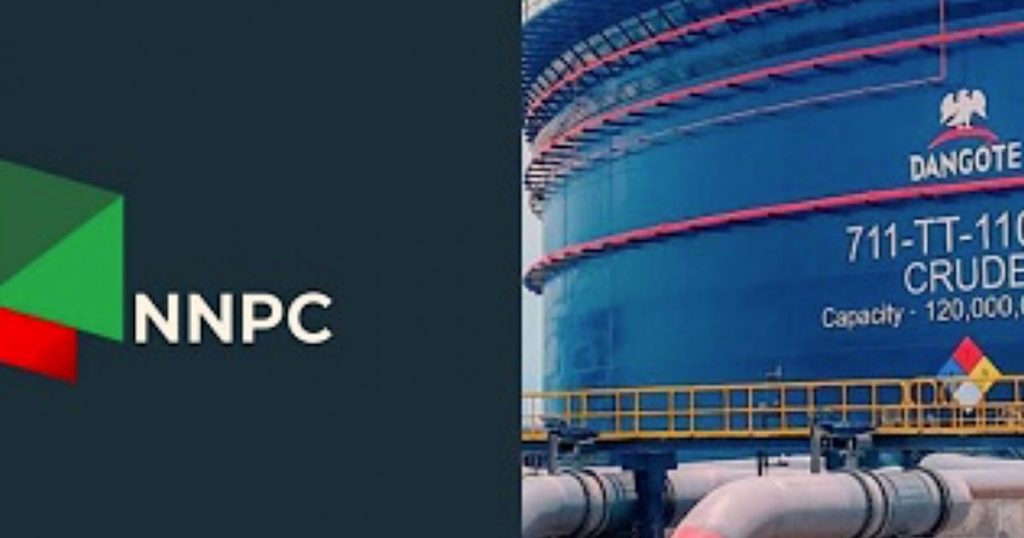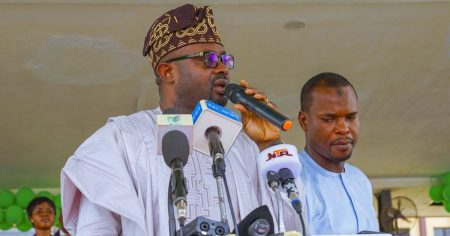The Nigerian government’s naira-for-crude policy, a strategic initiative designed to bolster fuel supply, stabilize prices, and strengthen the national currency, is poised for potential continuation despite the expiration of the initial six-month agreement with the Dangote Petroleum Refinery on March 31, 2025. Insider sources suggest that all parties involved, including the Federal Government, the Nigerian National Petroleum Company Limited (NNPC), and Dangote refinery, are expected to reconvene soon to discuss the future of the policy. The policy’s initial phase demonstrated positive impacts on fuel prices, broader economic indicators, and the foreign exchange rate, prompting the government’s inclination to maintain the program. However, the final decision hinges on a pending report from the Nigeria Upstream Petroleum Regulatory Commission, which is currently assessing the policy’s overall effectiveness and potential adjustments.
The naira-for-crude policy, launched on October 1, 2024, allowed the Dangote refinery to purchase crude oil using the Nigerian naira, effectively bypassing the need for dollar transactions. This arrangement aimed to reduce the nation’s reliance on imported petroleum products, thereby conserving foreign exchange reserves and stabilizing domestic fuel prices. The NNPC reportedly supplied 48 million barrels of crude oil under this agreement, contributing to the 84 million barrels total supplied to the refinery since its inception in 2023. While the initial contract period has elapsed, and Dangote Refinery has temporarily ceased naira-denominated fuel sales, ongoing discussions suggest a strong possibility of renewal, albeit with potential modifications to the agreement’s terms.
While discussions about the naira-for-crude policy’s future continue, Dangote Refinery has demonstrated operational progress, processing approximately 400,000 barrels of crude oil per day in 2025. Notably, about 35% of this crude oil, equivalent to 140,000 barrels per day or 12.6 million barrels over three months, was sourced through international imports. This diversification strategy, driven by fluctuating domestic crude availability, has led to new supply partnerships with Brazil and Equatorial Guinea. The inaugural shipment from Brazil’s Petrobras, consisting of one million barrels of Tupi crude, arrived on March 26, marking a significant milestone for the refinery’s global sourcing efforts. This international outreach reflects Dangote’s proactive approach to securing reliable crude supplies and optimizing its operational efficiency.
The relationship between the Dangote refinery and NNPC, its primary trade partner and minority stakeholder, has experienced certain complexities. NNPC, grappling with its own operational challenges, has consistently fallen short of its initial crude oil supply commitments to the refinery. This shortfall, coupled with the refinery’s obligation to sell refined products in naira under the initial agreement, has created financial challenges for Dangote. The company has reportedly expressed concerns about the forex risk associated with naira-denominated sales, particularly the potential losses stemming from the fluctuating dollar-naira exchange rate between the times of crude purchase and product sale. Despite these challenges, NNPC has reportedly allocated seven crude oil cargoes, equivalent to 245,000 barrels per day, for delivery to Dangote in April 2025, although the payment terms remain under negotiation.
The potential discontinuation of the naira-for-crude arrangement has sparked concerns within Nigeria, notably from human rights organizations like the Human Rights Writers Association (HURIWA). HURIWA has appealed to President Bola Tinubu to ensure the deal’s continuation, warning that its termination could trigger significant fuel price hikes, further exacerbating the economic hardship faced by millions of Nigerians. The organization argues that such a price increase could force businesses to close and lead to job losses, particularly within the small and medium-sized enterprise sector, which heavily relies on petrol-powered generators. Citing World Bank data on Nigeria’s multidimensional poverty index, HURIWA urges the government to carefully consider the far-reaching consequences of any policy changes that could further impoverish vulnerable households.
The naira-for-crude policy presents a complex economic equation for Nigeria. While its initial implementation has shown promise in terms of fuel price stabilization and forex conservation, operational challenges and financial considerations necessitate a thorough review before its continuation. Balancing the interests of the government, NNPC, and Dangote Refinery is crucial. The government’s commitment to a robust and transparent decision-making process, taking into account the potential socio-economic impact on Nigerian citizens, is essential. The forthcoming report from the Nigeria Upstream Petroleum Regulatory Commission will likely play a pivotal role in shaping the policy’s future, along with the subsequent negotiations between the key stakeholders. The final decision will undoubtedly have significant implications for Nigeria’s energy security, economic stability, and the overall well-being of its citizens.














